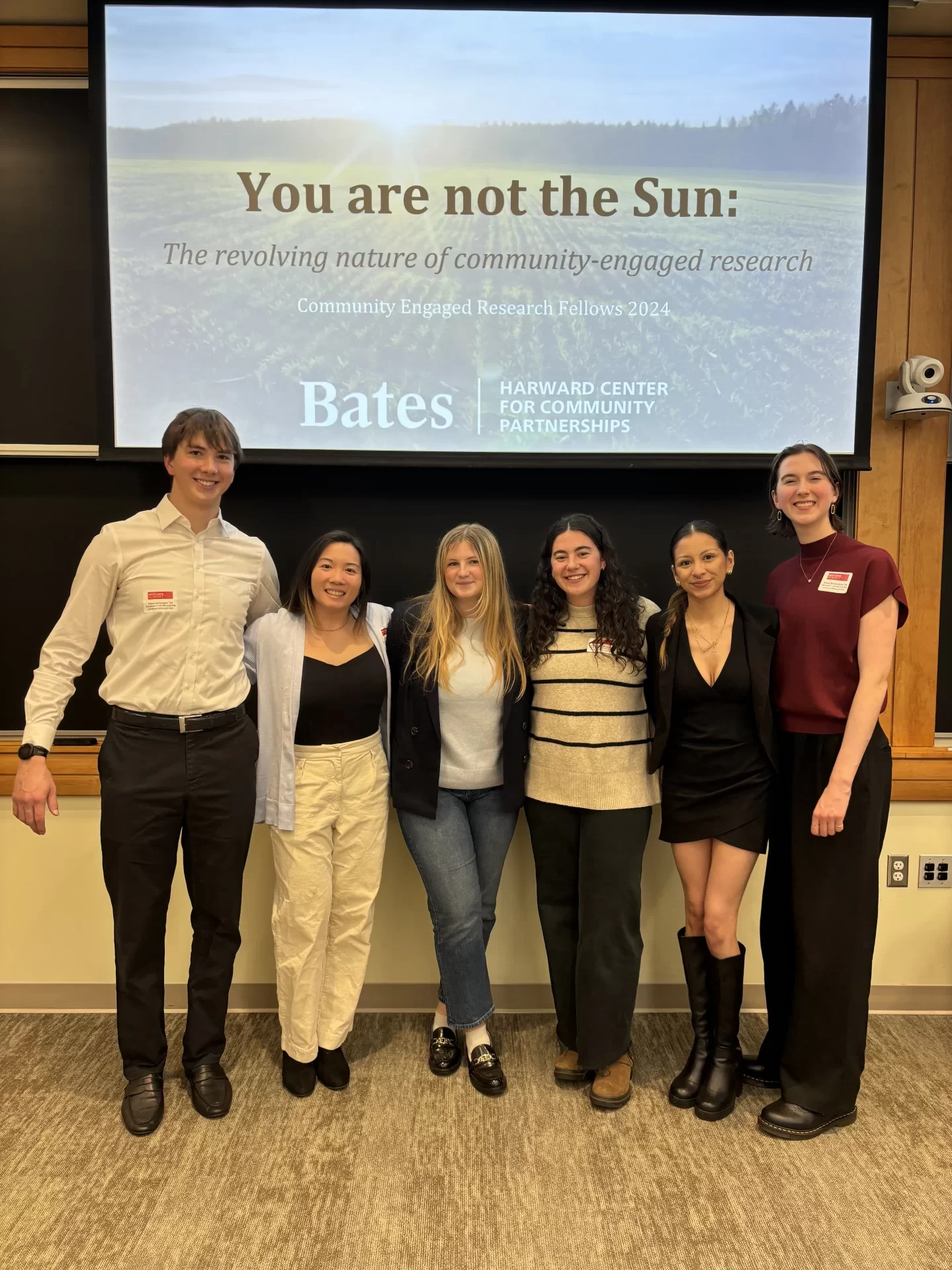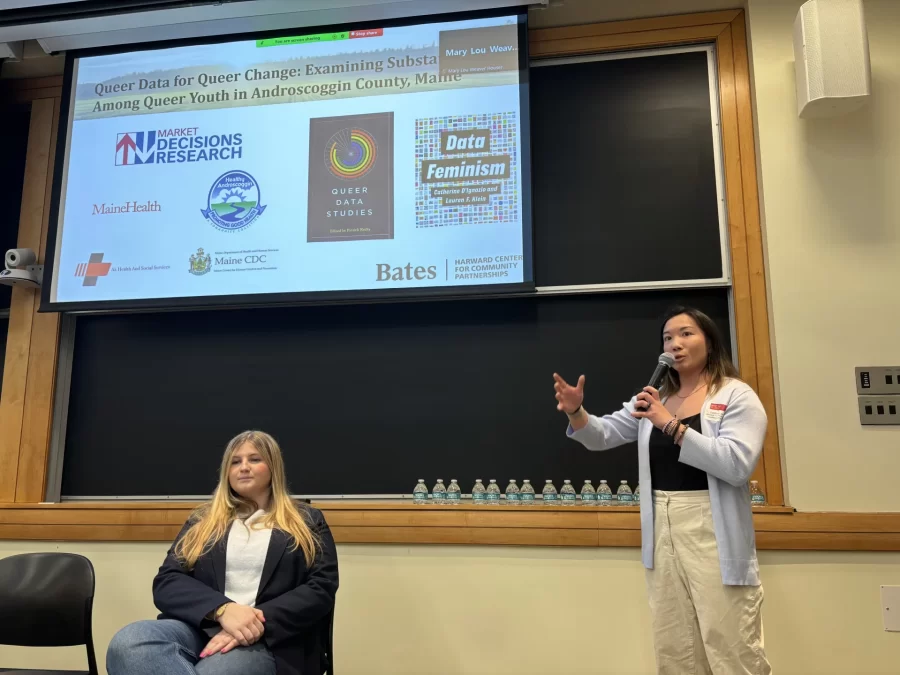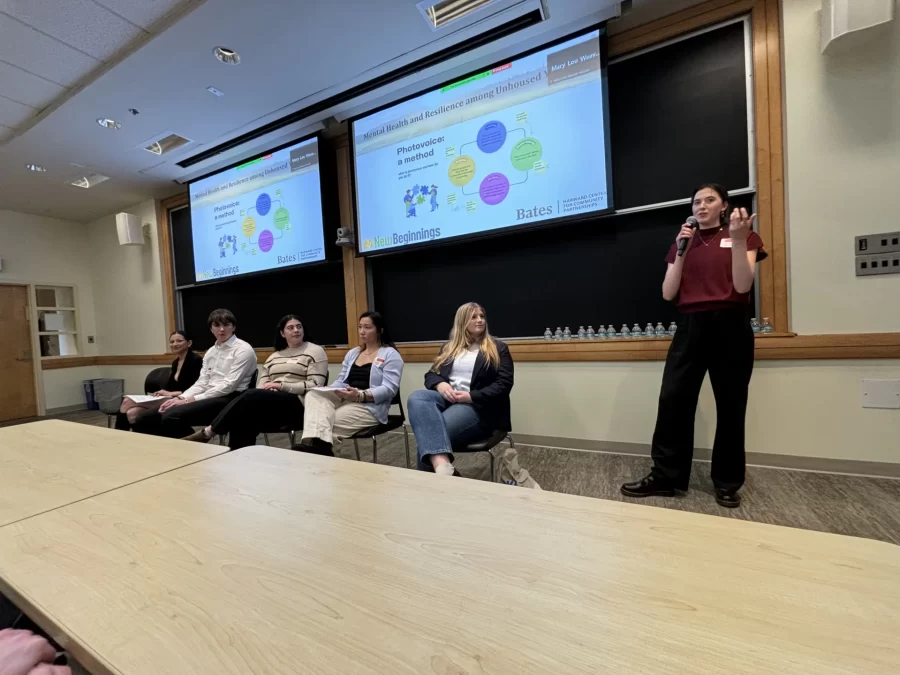Forging Deep and Meaningful Connections
The Harward Center’s Community-Engaged Research Fellowship offers mentoring, peer support, and funding for promising student research projects that address public needs and are informed by dialogue with community partners and academic research. Through the program, students grapple with the unique values and challenges inherent in community-based research while fostering an interdisciplinary peer community for collaborative knowledge sharing.
The 2023/2024 cohort of CER Fellows comprises six talented Bates seniors: Isaac Levinger, Samantha Shapiro, Alexa Bowerfind, Emma Volkers, Marisela Flores Pineda, and Caitlin Chan. All six fellows conducted either year-long or semester-long theses or capstone projects. Coming from diverse disciplines and departments across Bates College, all CER fellows collaborated with off-campus community partners and leveraged their research as tools for promoting societal change.
At the 2024 annual Mount David Summit, the CER fellows took the stage, sharing their research findings with the wider Bates community. Through engaging presentations, they delved into the essence of community-engaged research, emphasizing its transformative potential and inviting their peers to explore similar academic and civic engagement avenues. Their discussions underscored the vital role of forging deep and meaningful connections between academia and community partnerships.
Each fellow’s research journey was deeply personal, driven by their passions and academic aspirations. Collaborating with over ten community partners from Lewiston/Auburn and across New England, fellows researched various issues, from mental health to homelessness.
In a recent conversation, Caitlin Chan, a CER fellow majoring in Mathematics and Gender and Sexuality Studies, expressed her profound gratitude for the opportunities provided by the CER program: “My experience as a Community-Engaged Research Fellow has been so unique for me. It brought me closer to the Lewiston Auburn community and helped me collaborate and build connections with the people. Through my thesis, I collaborated with five different community partners, which helped me learn from them and develop new skills that complement my career goals.”
In her research, Caitlin focused on exploring the risk and protective factors surrounding substance use among queer youth in Androscoggin County. Speaking about her thesis, Caitlin shared, “I used three different hybrid frameworks—the Minority Stress Theory, Adverse Childhood Experiences(ACES), and the Empower Action Model—to explore the risk and protective factors prevalent in substance use among queer youth in Androscoggin County. Through my exploratory data analysis, I was able to establish that queer youth were more likely to exhibit risk factors for substance use and had fewer protective factors compared to non-queer youth.”
Reflecting on her experience with community-engaged research, Caitlin underscored the transformative nature of this kind of academic pursuit. She emphasized its capacity to foster collaboration among students and community partners, fostering a nurturing environment conducive to personal development and knowledge acquisition: “The CER thesis is different from the traditional thesis, where students mainly focus on the topic of interest. The community-engaged aspect of the thesis opens new doors for interactions with the community and learning through real-world case scenarios.”
Caitlin also encouraged students to venture beyond the confines of Bates. “There are numerous invaluable programs available for students to explore,” she emphasized. “I think every student should step outside their Bates bubble and engage with the L/A community.”
Also reflecting on his work as a CER Fellow, Isaac Levinger ’24, a sociology major from Rockville, Maryland, emphasized the opportunities provided by the Harward Center in expanding his horizons beyond Bates. Isaac shared, “I really appreciate the structure that the Harward Center for Community Partnerships gave me in exploring beyond Bates. You have everything at your fingertips at Bates to learn what it means to be a grounded citizen and be civically engaged and community-minded.”
In his research, Isaac focused on educational inequality experienced by Black immigrant students in urban schools, particularly examining their relationships and experiences within the educational system. Isaac’s work highlighted issues such as racialized tracking while identifying opportunities for success through collaboration and community engagement. Through his research, Isaac exemplified the commitment of CER fellows to addressing pressing social issues and fostering positive change within local communities.
Celebrating their achievements, we congratulate all the CER Fellows in the 2023/2024 cohort. Their dedication, passion, and commitment to community-engaged research have left an indelible mark on the Bates College community and the broader Lewiston/Auburn area. We are immensely proud of their achievements and the positive impact they have made through their scholarly endeavors. The CER Program runs each winter term, supporting Bates students who immerse themselves in meaningful research projects in collaboration with off-campus partners. If you are a student interested in community-engaged research, you can contact Morgan Kinney, Associate Director of Community-Engaged Learning and Research at the Harward Center.


